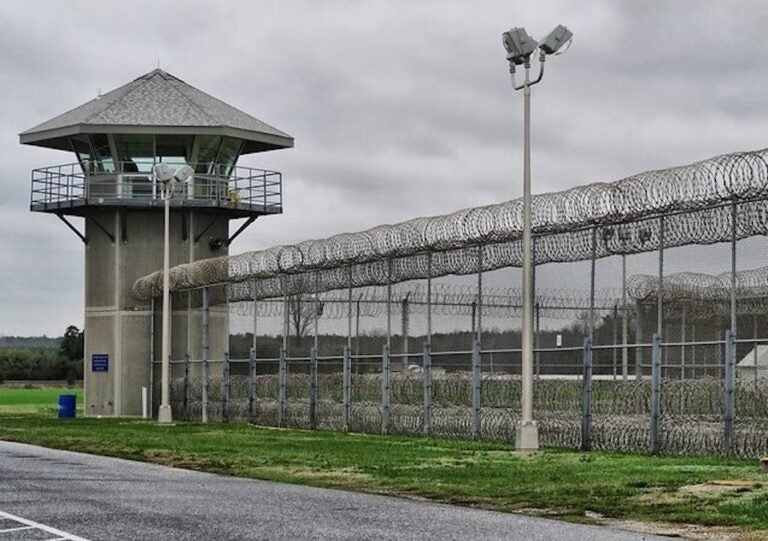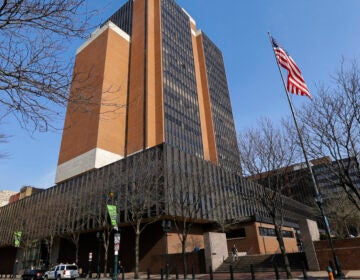Delaware ACLU in federal court to fight ‘unprovoked violence’ against prisoners
The first of several lawsuits coming from the civil rights organization accuses a correctional officer of leading the beatings of two men last year, a month apart.

Sussex Correctional Institution (State of Delaware)
The Delaware chapter of the American Civil Liberties Union has set its sights on what its legal director calls systemic violence against prisoners at Sussex Correctional Institution and other state prisons.
Attorney Susan Burke started the ACLU’s offensive against the Delaware Department of Correction this month by suing the Sussex County prison on behalf of two detainees who claim they were severely beaten this year without provocation by the same guard, Kirk Neal.
The filing in U.S. District Court claims that other correctional officers joined the attack and that their actions were condoned by warden Truman Mears and deputy warden Jon Beck.
Burke and outside litigator Daniel A. Griffith contend in the lawsuit that the alleged attacks, which were captured on surveillance cameras that the plaintiffs have yet to see, “are part of an ongoing and egregious pattern of the use of excessive force” at Delaware’s southernmost prison, located in Georgetown.
“The level of violence is startling and very depressing, and so we are hoping to put a stop to the ongoing violence down at Sussex Correctional Institution,’’ Burke said.
Jason Miller, spokesman for the prison system, said in a written statement the officials “are reviewing”’ the allegations and “will respond to the court.”

Burke, who previously had a private practice in Philadelphia and Washington, D.C., formerly won a $5.3 million settlement from a U.S. contractor for detainees who were abused at the Abu Ghraib prison facility in Iraq.
The current lawsuit is the first the ACLU has filed against the Delaware prison system in recent years, and Burke said more are in the works.
“The ACLU receives a significant amount of correspondence from folks that are presently incarcerated,’’ she said. “And when we review it in the aggregate and we look at the trends, it is clear that there are some very troubling trends in Delaware’s prisons. We began with Sussex and the violence there, but our lens is broader than that.”
‘Pulled his dreadlocks from his head, leaving bald spots’
The current lawsuit was filed on behalf of Isaac Montague and William Davis for separate alleged attacks in September and October.
Montague claims in the lawsuit that he encountered Neal on Sept. 18 when he lined up “to use the free phone, and obtain his commissary sheet, phone sheet and toilet paper.’’ Neal said he could not use the phone and had to return to his cell for “lock in,” the lawsuit said.
On the way to his cell, Montague alleged that Neal followed him and would not let Montague close the cell door after they arrived, then jumped in and out of the doorway, and called “a code,” the lawsuit said.
Montague claims he “immediately laid down on the floor of his cell on his stomach with his hands behind his back,’’ but Neal kneed him in the side of his face and three other officers joined him.
They kicked and punched Montague, “pulled his dreadlocks from his head, leaving bald spots,’’ and one hit Montague in his face with his handcuffs, “causing a permanent scar,” the lawsuit said.
Neal and guard Ryan Maddox called him a “racist name,’’ and Maddox thrust a can of pepper spray into Montague’s mouth, and pressed on the nozzle. Neal and Maddox are white, and Montague is Black.
Other correctional officers watched but “none attempted to halt the assault,’’ the lawsuit said.
Afterward, Montague could not walk, so an unidentified guard put him on a gurney and took him to the infirmary, where a nurse “patched up his bleeding face.”
Then Montague was put in solitary confinement, which the lawsuit identified as “the hole,” for 21 days and did not receive adequate medical treatment – only ice for his injuries. His eye remained swollen for several days, the lawsuit said, and still “remains darkened” and he still has “sudden sharp pains in his head.”
Montague claims he filed grievances but “all were ignored or disregarded.”
‘Slammed him, face first, into the tiled concrete floor’
Davis claims the attack against him occurred Oct. 18 while there was a 72-hour delay in his release from detention, even though the court had ordered him freed.
Davis contends in the lawsuit he approached Neal at the control desk and asked about the situation, but the guard ignored him.
An hour later, Davis claims he thought he heard his name called over the intercom system and approached another guard. Neal saw what was going on and “screamed’’ that Davis’ name had not been called, the lawsuit said.
Davis claims he went back to the desk 10 minutes later and asked another officer to “read the status sheet to him because he did not have his glasses.”
Instead, Neal cursed Davis, then grabbed him, led him down the tier and, cursing, asked him where he lived.
Davis said he told Neal he lived in Bear, but said the guard became “enraged” that he didn’t provide his cell block, then slammed him to the ground and kicked and punched him. Other guards joined the attack, the lawsuit said, with the assault continuing even after he was handcuffed.
One of the guards, identified only as “Defendant Evanglett,” pepper-sprayed Davis in the face, and inserted the nozzle into his nose, the suit alleges.
Davis claims he had “severe difficulty breathing” and thought he was going to die. But the nozzle broke off and pepper spray began spewing on the guards, so the beating stopped, the lawsuit said.
But it wasn’t over, because Neal took Davis to a holding cell and while he was handcuffed, “slammed him, face first, into the tiled concrete floor,” the lawsuit said.
Davis said he had serious head injuries but did not get a medical evaluation.
That evening, Davis was released and his mother took him to the emergency room where he received treatment for ‘substantial injuries to his head and brain,’’ the lawsuit said.
The lawsuit claims that prison leaders Mears and Beck were negligent because they knew about the “excessive force’’ used on Montague and “despite knowing the details and having access to a videotaped recording of the assault, failed to discipline [Neal] and prevent the alleged attack on Davis.”
Burke said the ACLU will seek to prove a “structural breakdown” at the Sussex prison.
“What happens over time is if violence becomes a majority culture, it keeps getting more and more aggravated and more, as you put it, a quick trigger. And so that’s why lawsuits are important.”
“We have to force the commissioner and all of the structure of the Department of Correction to make sure that they are constantly monitoring and supervising the correctional officers who are in day-to-day contact with the persons who are incarcerated.”

Saturdays just got more interesting.
WHYY is your source for fact-based, in-depth journalism and information. As a nonprofit organization, we rely on financial support from readers like you. Please give today.






